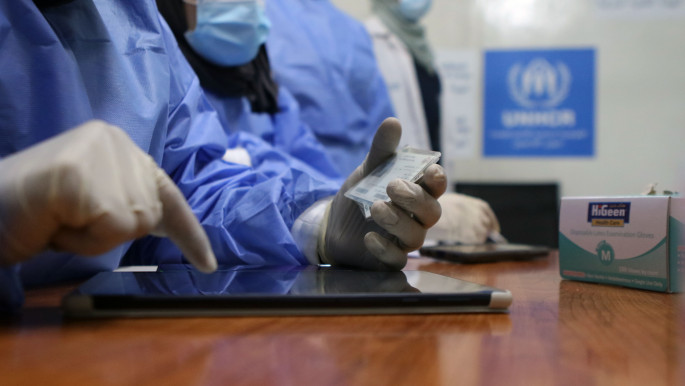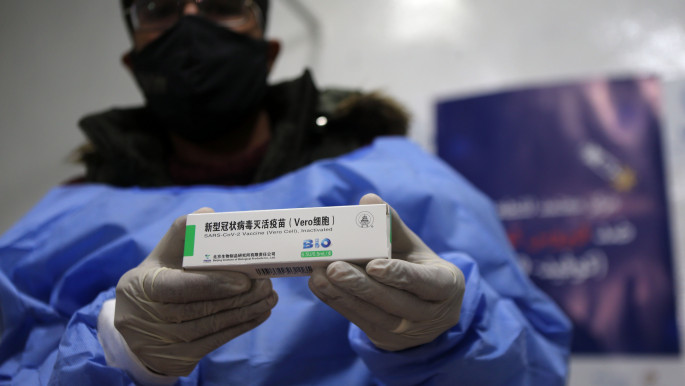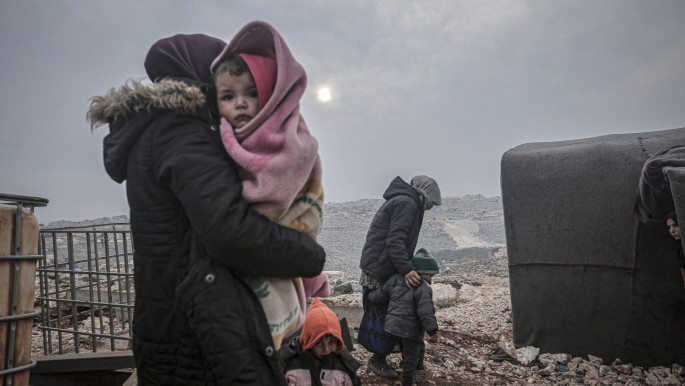Jordan 'shows exemplary solidarity' by becoming first country to include refugees in COVID-19 vaccination rollout
In mid-January, Jordan became one of the world's first countries to launch a comprehensive, free COVID-19 vaccination programme for refugees and asylum seekers. Under its national plan, anyone living in the country is eligible to receive the vaccine free of charge.
The Jordanian Ministry of Health currently administers the vaccination across the country. The UN refugee agency supports the inoculation campaign through coordinating closely with the ministry of health to ensure refugees are included, and helping to reach those housed in the Zaatari and Azraq camps for Syrian refugees.
While national authorities are responsible for procuring vaccinations, UNHCR is assisting through other COVID-preparedness and response interventions among which are health, sanitation, hygiene, logistical support and personal protective equipment.
"Once again Jordan has shown exemplary leadership and solidarity in hosting refugees. The country has included refugees in every aspect of the public health response to the pandemic, including the national vaccination campaign, proving how it should be done if we are to keep everyone safe," UN High Commissioner for Refugees, Filippo Grand stated in a press release.
Read also: Jordan demands Israel vaccinate Palestinians as covid-19 continues to ravage region
Speaking to The New Arab, UNHCR's Jordan spokesperson Lilly Carlisle said the government-led effort was made possible by the close cooperation between the Jordanian executive and the health ministry and the UN agency who acted promptly, since the beginning of the pandemic, in making sure refugees are "incorporated" in the public health response plan.
 |
Jordan has a long history of welcoming refugees, it was very open in including everyone in the vaccination rollout, irrespective of their nationality |  |
"Jordan has a long history of welcoming refugees, it was very open in including everyone in the vaccination rollout, irrespective of their nationality," the spokeswoman commented, "and it's been widely accepted that this part of the national response to the health crisis."
Refugees and asylum seekers can register on the COVID-19 national vaccination platform via the government's portal, enter their passport number or, if not passport holders, they can supply details of their UNHCR documentation.
They will then receive an SMS with the date of appointment and information about how to access the nearest health clinic to receive the vaccine.
With a population of 10.5 million, Jordan hosts a refugee population of around 700,000 of which hundreds of thousands of refugees from the neighbouring conflicts in Syria, Iraq, Yemen, and Libya.
Syrians make the second highest share of refugees per capita globally. There are 70,000 Iraqis along with tens of thousands of Yemenis, Sudanese, Somalis and other foreign nationals. Roughly 80 percent of these refugees live in Jordan's urban centres and are to be vaccinated in these local health clinics independently of UNHCR.
A first batch of 43 Iraqis and Syrians were vaccinated in the northern towns of Irbid and Mafraq, near the border with Syria.
 |
A first batch of 43 Iraqis and Syrians were vaccinated in the northern towns of Irbid and Mafraq, near the border with Syria |  |
 |
|
 |
|
| Jordan is the first country in the world to include refugees in its nationwide COVID-19 vaccination drive [Getty] |
Ziad Al-Kabasi, a doctor, and his wife Raja, a pharmacist, an Iraqi couple living in Irbid, were among the first refugees in the country to receive the shot three days after Jordan's campaign of free vaccinations of registered refugees kicked off on 13 January.
"We just want life to be back to normal. The vaccine is the right way of doing this," Raja said on that day.
"Regardless of everything, they are refugees, like our brothers and sons who are present in Jordan. If we don't vaccinate them, and only vaccinate Jordanians, then the pandemic will persist among them," the head of the Irbid vaccination centre, Ali Alzetaye, said in a UNHCR statement.
The refugee outreach is part of Jordan's wider strategy to inoculate the most vulnerable in the society, no matter their origin, so to protect the entire population.
Samia Qumri, a Jordan-based independent researcher working on refugee issues, explained that the pioneering plan is the result of years of strong partnership between the government and UNHCR as well as other agencies ever since the kingdom experienced large inflows of refugees and asylum seekers.
"It's a massive step to see these vulnerable communities covered under the national inoculation programme at a time when countries are struggling with deliveries and distribution of vaccines within their own borders," she told The New Arab, "Jordan is presenting a strong case for the importance of being inclusive."
 |
Regardless of everything, they are refugees, like our brothers and sons who are present in Jordan. If we don't vaccinate them, and only vaccinate Jordanians, then the pandemic will persist among them |  |
But the small Arab state is far from securing sufficient doses to vaccinate the majority of its residents. In January, it reportedly signed a deal to buy one million doses of the Pfizer-BioNTech's vaccine and secured an extra two million doses via the global COVAX initiative which aims to ensure that all nations have fair access to COVID-19 vaccines.
 |
|
| Read also: Syria's bleak decade |
The amounts contracted would be enough to treat 20 percent of the country's population, primarily those falling in the priority categories.
In spite of the limited resources and vaccine doses, the Jordanian government, in tandem with UNCHR, opened on 15 February in its huge Zaatari campsite, on the northern border with Syria, the first COVID-19 vaccination unit in a refugee camp in the world.
"Jordan is the first country in the world to include refugees in its nationwide COVID-19 vaccination drive. The vaccination centre in Zaatari is also the first in the world at a UN-administered refugee camp," Mohammad Hawari, spokesman in Jordan for the UN refugee agency told Arab News.
He stated that initially some 2,000 of the 80,000 inhabitants of Zaatari, categorised as first-tier recipients, had signed up with the government to receive the jab. About 1,200 of them qualified under the national priority system for health workers, people older than 65 and those with underlying health conditions.
Teams of health workers receive patients, browse their medical history, and ask them a set of questions before they administer the vaccine.
For elderly refugees and those with chronic diseases or disabilities who cannot reach the Zaatari vaccination centre, health staffs can go vaccinate them inside their homes in the camp.
The number of refugees vaccinated in the camps totalled 488 refugees as of 10 March, according to Carlisle, however the number is likely to be much higher since the agency does not know the tally for the refugees living in urban areas, who are vaccinated at their local health clinics (not in UNHCR's remit). She added that at least 42 centres are currently open nation-wide to distribute the vaccine, including the Zaatari and Azraq refugee camps.
More than 500,000 Jordanians and residents have registered to receive a coronavirus vaccine, the National Centre for Security and Crisis Management told the Jordan News Agency Petra on 15 March. Only over 155,000 people across the kingdom have received their first dose and 48,380 have been fully vaccinated, Petra reported.
Like many other countries, Jordan is experiencing difficulties in obtaining enough amounts of vaccines amid talks underway that additional supplies will be delivered this month.
 |
Doses are being ordered but we're not receiving enough, people have been registering for vaccination but many haven't got their first jab yet or are waiting to get their appointments |  |
In recent comments, the Jordanian Foreign Minister Ayman Safadi told DW that his country had not received sufficient doses from the COVAX programme. The kingdom is expected to receive just 437,000 doses under its first COVAX allocation.
As of 12 March, Jordan received the first shipment of 144,000 doses of the AstraZeneca/SK Bioscience coronavirus vaccine through the COVAX facility. The second shipment of vaccines from the COVAX is expected to arrive in April, according to the ministry of health.
Qumri, who previously worked with UNICEF and UNHCR-Jordan on the Syrian response, criticised a "fluctuation" in the information given by official sources in Jordan.
"It's hard to know what's being administered as we're getting different statements from officials every day," the researcher argued.
"Doses are being ordered but we're not receiving enough, people have been registering for vaccination but many haven't got their first jab yet or are waiting to get their appointments," she added highlighting the inconsistency.
The UNHCR says the proportion of refugees with COVID-19 in Jordan has remained low at 1.6 percent, compared to three percent among the wider population, thanks to strict measures adopted by the government to prevent the virus spread and the collaboration between Jordanian authorities and the international refugee organisation.
Jordan is facing a spike in coronavirus infections attributed mainly to the fast transmission of the variant first identified in the UK. The country has recorded 401,319 coronavirus cases since March last year along with 5,428 deaths.
Alessandra Bajec is a freelance journalist currently based in Tunis.
Follow her on Twitter: @AlessandraBajec





 Follow the Middle East's top stories in English at The New Arab on Google News
Follow the Middle East's top stories in English at The New Arab on Google News


